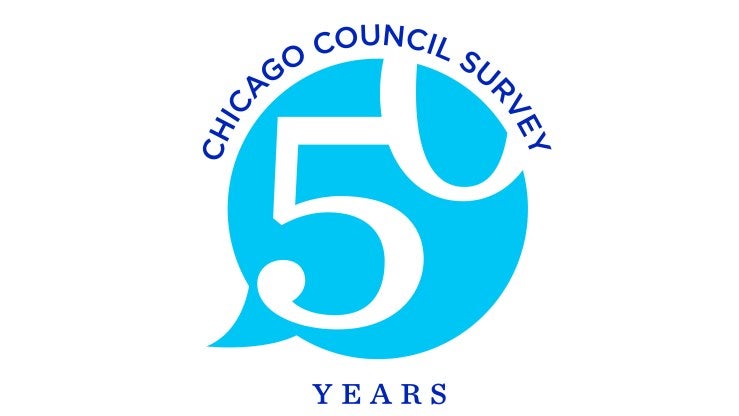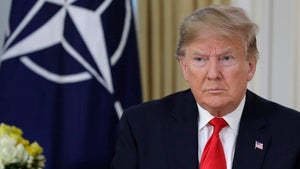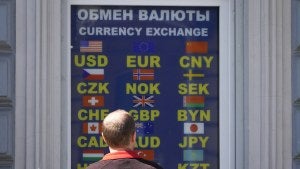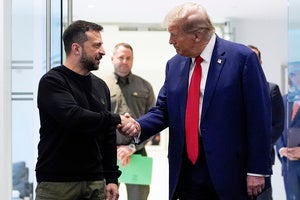In a 21-point shift, 51 percent of Republicans now favor providing US military aid to Kyiv.
As President Donald Trump prepares to meet with Russian President Vladimir Putin in Alaska on Friday, a just-completed Chicago Council on Global Affairs poll, fielded July 18–30, 2025, finds that American public support for sending military and economic aid to Ukraine has increased since March—especially among Republican Party supporters. These changes in GOP opinion could reflect Trump’s recently shifting policies and rhetoric and Trump’s own growing frustration with Putin’s “tapping him along.”
Key Findings
- Overall, six in 10 continue to support the United States sending arms and military supplies to Kyiv (62%, up from 52% in March) and providing economic assistance to Ukraine (61%, up from 55% in March)
- The most substantial shifts are among Republicans (+9 percentage points for economic assistance, +21 military aid) and Independents (+7 economic, +10 military). In fact, 51 percent of Republicans now support providing military aid to Ukraine.
- Large majorities of both Republicans (74%) and Democrats (77%) support increasing sanctions against Russia.
- The potential for Putin’s refusal of a peace deal does not seem to impact American public support for US policies toward Ukraine.
- Six in 10 Americans (60%) express a favorable view of Ukrainian President Volodymyr Zelenskyy; just 10 percent view Putin favorably.
Majorities of Americans—Including Republicans—Back Military Aid to Ukraine
The upcoming meeting in Alaska is the latest attempt to make progress toward ending the war in Ukraine. The Trump administration has threatened additional sanctions against Russia, imposed tariffs on Russia’s trading partners India and China, and temporarily halted US assistance to Ukraine as tools to coerce the parties to the negotiating table. But so far, a ceasefire has been elusive.
For their part, majorities of the American public still want the United States to assist Ukraine, and more so now than five months ago. Six in 10 Americans support providing additional arms and military supplies to Kyiv (62%, up from 52%). This includes a majority of self-described Republicans: 51 percent now support sending additional arms and military supplies to the Ukrainian government, up markedly from just 30 percent in March and returning to 2023 levels. An equal proportion of Republicans oppose sending additional materiél to Kyiv (48%, down from 68% in March).
There are also divisions within the Republican camp: those Republicans who self-identify as supporters of the “MAGA movement”1 are divided (49% support vs. 50% oppose) compared to a majority of nearly six in 10 non-MAGA Republicans who favor continued military assistance (57%, 41% oppose).
Independents are also more likely to support military aid, up 10 percentage points since March (61% from 51%). For their part, Democratic support for assisting Ukraine remains high (75%) and fairly stable from recent polls.
Americans (61%, up from 52% in March) also favor providing economic assistance to Ukraine. While partisan differences are greater on economic than military aid, support for economic assistance to Kyiv has also risen among Republicans. Today, four in 10 Republicans (41%) support economic assistance to Kyiv, up from 32 percent in March. Perhaps for some Republicans, Trump’s ability to secure a minerals deal with Ukraine in April gave them a sense that Ukraine is repaying the United States for past assistance. Here, too, there are divisions among Republicans: only a third of MAGA Republicans (35%) support additional economic aid, while nearly six in 10 non-MAGA Republicans endorse it (57%).
More Independents also now favor economic assistance (61%, up from 54% in March and closer to 2023 readings). For their part, Democrats continue to support economic aid to Kyiv (79%, consistent with previous support).
Bipartisan Majorities Support Tightening Sanctions Regime Against Russia
Trump met virtually with European Union leaders and Zelenskyy on August 13 to calm fears that Trump and Putin could reach an agreement and try to impose a settlement on Ukraine. Apparently, Trump is going to attempt to entice the Russian leader to negotiate by offering economic opportunities and access to rare earth minerals in Ukrainian areas occupied by Russia.
While these economic carrots might prove helpful, additional sanctions could also be employed as an economic stick (given that Trump has mentioned economic sanctions many times before). Large bipartisan majorities would support that path. Overall 73 percent now, up from 66 percent in March, would support increasing sanctions against Russia. As in past surveys, three-quarters of both Republicans (74%, including 75% of MAGA Republicans) and Democrats (77%) would support additional diplomatic and economic sanctions, as would 69 percent of Independents.
Bipartisan Majorities Continue to Oppose Sending US Troops Into Conflict
Like President Joe Biden, Trump has opposed direct US military intervention using American troops, and the majority of Americans support keeping US soldiers out of the conflict (63% oppose sending troops). Only a third are willing to send US troops to help the Ukrainian government defend itself against Russia (35%), a bit higher than recent levels but still only a minority. Democrats are now more willing to send American troops to help Kyiv than they have ever been before, with 48 percent in favor. At the same time, Republicans are at their lowest level (20%; 17% among MAGA Republicans and 25% non-MAGA).
Potential Russian Refusal of Peace Deal Does Not Affect Public Attitudes
Some view a potential Russian refusal to sign on to a peace deal as a catalyst for greater US involvement in the conflict in Ukraine. To test this, the 2025 Chicago Council Survey included a second version of the policy options regarding Ukraine. The second version included the prompt “if Russia does not agree to a peace deal.” Both questions otherwise provided the same policy options. As the experiment demonstrated, a potential Russian refusal of a peace deal does not seem to impact American public support (or partisan support) for any of the four policies. Results are largely similar to the results discussed previously, including partisan differences (see Appendix Figures A and B for partisan breakdowns).
Majorities Are Negative toward Putin, Positive Toward Zelenskyy
While the official Trump administration’s stance toward Russia has shifted over the course of Trump’s seven months in his new term, the American public for the most part largely continues to view Putin unfavorably (10% favorable). That said, Republicans are more positive now than the extreme lows of March 2022, just after Russia invaded Ukraine (14% compared to 6%). Among MAGA Republicans, 17 percent are favorable; among non-MAGA Republicans, only 9 percent agree.
On the other hand, a majority of Americans continue to view Zelenskyy in a positive light. Currently six in 10 express a favorable view (60%), though recent readings have been lower than the very large majorities who were positive in March 2022. Zelenskyy’s ratings are highest among Democrats (77%) and Independents (60%). While just 41 percent of Republicans view Zelenskyy favorably, this is a marked improvement from 28 percent in March 2025, just after the infamous meeting in the Oval Office when Trump and Vice President JD Vance gave the Ukrainian president a “dressing down.” Among those Republicans who consider themselves part of the MAGA movement, just a third (34%) are favorable toward Zelenskyy. But a majority of other Republicans (54%) are favorable.
Americans Think US-Led Negotiations Should Include Russia, Ukraine, and Europe
A March 2025 Chicago Council-Ipsos survey conducted just after the fated Trump-Zelenskyy Oval Office meeting in February asked Americans which countries should be included in negotiations to end the war in Ukraine. Across the board, most said the United States, the European Union, Russia, and Ukraine should all be included (69% overall). Nearly three in four Democrats (77%) and Independents (73%) and six in 10 Republicans (60%) agreed that all four parties should have a seat at the table. (Appendix Figure C).
When Americans were asked about acceptable conditions to end the peace in Ukraine in the same March 2025 survey, large percentages of Americans said they don’t know enough to give an opinion or do not give an answer. They were fairly divided on the possibility Russia keeping Crimea in a peace settlement (38% acceptable, 31% unacceptable). But they opposed the prospect of Russia keeping any additional territory it occupies (19% acceptable, 58% unacceptable) (Appendix Figure D).
Conclusion
With all eyes on Trump and Putin’s upcoming Alaska meeting—potentially the first of several critical high-level meetings on the war—the American public is more willing to back Ukraine in the conflict than it has been in the past two years. There are still substantial differences between Republican and Democratic views on US policy toward Ukraine, but these differences have narrowed since last March.
Trump’s public expressions of frustration with Putin and his subsequent decision to sell US military equipment to Europe to send to Ukraine may have loosened some Republicans’ opposition to some of these policies. However, Trump’s attitudes towards Kyiv and the ultimate outcome of the conflict have swung back and forth in the first seven months of the administration. It is entirely possible that, should Trump turn his back on Kyiv and embrace Putin’s views of the war, that his Republican base would join him.
- 1
Sixty-seven percent of self-described Republicans say they consider themselves supporters of the Make America Great Again or MAGA movement.
This analysis is primarily based on data from the 2025 Chicago Council Survey of the American public on foreign policy, a project of the Lester Crown Center on US Foreign Policy.
The 2025 Chicago Council Survey was conducted July 18-30, 2025, by Ipsos using its large-scale nationwide online research panel (KnowledgePanel) in English and Spanish among a weighted national sample of 2,148 adults 18 or older living in all 50 US states and the District of Columbia. The margin of sampling error for the full sample is ±2.2 percentage points, including a design effect of 1.07.
Partisan identification is based on how respondents answered a standard partisan self-identification question: “Generally speaking, do you think of yourself as a Republican, a Democrat, an Independent, or what?”
The 2025 Chicago Council Survey is made possible by the generous support of the Crown family and the Korea Foundation.
Additional results reported from March 2025 are from a Chicago Council on Global Affairs-Ipsos survey conducted March 14-16, 2025 by Ipsos using its large-scale, nationwide, online research panel (KnowledgePanel) among a weighted national sample of 1,021 adults 18 or older living in all 50 US states and the District of Columbia. The margin of sampling error for the full sample is ±3.2 percentage points including a design effect of 1.09.
The data for the total sample were weighted to adjust for gender by age, race/ethnicity, education, Census region, metropolitan status, and household income using demographic benchmarks from the 2024 March Supplement of the Current Population Survey (CPS). The specific categories used were:
- Gender (Male, Female) by Age (18–29, 30–44, 45-59 and 60+)
- Race/Hispanic Ethnicity (White Non-Hispanic, Black Non-Hispanic, Other, Non-Hispanic, Hispanic, 2+ Races, Non-Hispanic)
- Education (Less than High School, High School, Some College, Bachelor or higher)
- Census Region (Northeast, Midwest, South, West)
- Metropolitan status (Metro, non-Metro)
- Household Income (Under $25,000, $25,000-$49,999, $50,000-$74,999, $75,000-$99,999, $100,000-$149,999, $150,000+)






Related Content
 Public Opinion
Public Opinion
While down slightly from last year, more than half support continuing military and economic assistance to Kyiv. But the results are highly partisan.
 Public Opinion
Public Opinion
The gap between Democrats and Republicans on America's NATO commitment has reached an all-time high in Council polling dating back to 1974.
 Public Opinion
Public Opinion
Most believe Russia should continue to pursue an independent foreign policy despite the sanctions, which are attributed to the West’s hostility and misunderstanding of the situation in Ukraine.
 Public Opinion
Public Opinion
While most support providing medevac services to injured peacekeepers, the public is divided over backing a peacekeeping force militarily.
